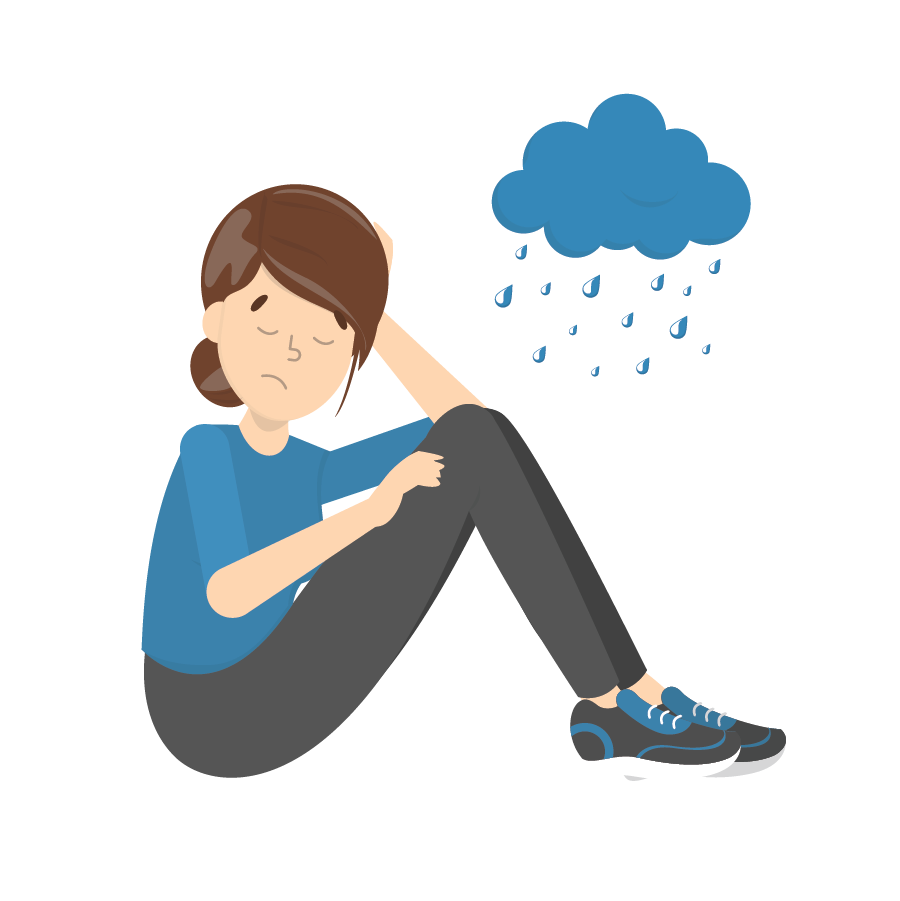
Counselling for Depression for Children, Teens & Adults
Depression is hard and we are here for you. Although having depression may feel like an endless abyss of sadness and hopelessness, there is hope. Therapy has been proven to effectively reduce symptoms of depression by helping individuals recognize and challenge the beliefs, thoughts, and feelings contributing to the condition.
What is Depression?
Depression is a serious mental health issue that is characterized by episodes of deep sadness and loss of interest that can last from days to months. Depression is different than feeling sad due of a painful event or grieving the loss of a loved one. Although the loss of a loved one, a job or a relationship can cause a person to feel sad and experience symptoms similar to depression, grief and depression are different and recognizing these differences improves the care a person can receive. It is normal to experience sadness when grieving, but, unlike with depression, this sadness is not accompanied by feelings of worthlessness, low self-esteem, and self-loathing. Additionally, people who are grieving are processing a difficult time, but may still experience positive emotions or reminisce in heartfelt memories.
Could You Have Depression?
Depression as a disorder does not just manifest as feelings of sadness, as it is often accompanied by feelings of worthlessness, loss of interest, feelings of emptiness, exhaustion, and even physical pain or indigestion.
-

Deep Sadness
People with depression may experience persistent sadness which can last from several days to months.
-

Feelings of Worthlessness
Depression is often accompanied by feelings of worthlessness, hopelessness, shame, and a fear of being judged.
-

Loss of Interest
Losing interest in activities they once enjoyed is commonly observed in people with major depressive disorder.
-

Loss of Sleep
Depression can be both caused by and cause issues falling asleep. Resting for 8 hours can improve symptoms of depression.
-

Loss or Gain of Appetite
Every person is different as some people may resort to food to feel better while other refrain from eating at all when depressed.
-

Fatigued and Tired
Depression can cause a person to feel heavy, exhausted, drained, and a general feeling of being unable to move.
-

Irritability
When depressed, a person’s nerves are frayed causing them to feel irritable, impatient, and prone to explosive outbursts.
-

Difficulty Concentrating
Depression can cause a person to feel like their thoughts are hazy and difficult to sort which makes focusing a challenge.
-

Suicidal Thoughts
Depression is overwhelming and can cause a person to feel like there is no hope. If you are feeling suicidal, please call 833-456-4566.
Depression in Men
Although both men and women experience depression, their symptoms can vary drastically. Depression in women mostly manifests itself as sadness and self-deprecation, while in men, it appears as irritability, aggression and uncontrolled rage. Additionally, women are more likely to talk about and recognize depression, therefore more likely to seek treatment.
Unfortunately, due to a lack of awareness regarding depression in men, the condition is often more life threatening. Even though, women are more likely to be diagnosed with depression, they have a significantly lower rate of suicide than men.
Depression in Teenagers
Becoming a teenager introduces a host of new experiences including a changing body, peer pressure, increased academic expectations, new relationships and new schools. Additionally, the pressure from peers to conform on social media can harm their self-image. These changes can be a lot for a teenager to manage, and may sometimes lead to feelings of depression, loneliness, worthlessness, ineptitude and low self-esteem.
Although many of the symptoms are the same, teenagers with depression display more behavioural changes than adults with the condition. Teenagers may become highly sensitive to criticism, experience angry outbursts, begin experimenting with substances, neglect personal hygiene, miss school or stop caring about academic performance, and, in some cases, begin self-harming behaviour. Therapy can help teenagers develop coping skills and strategies that can help them throughout their lifetime.
Postpartum Depression
Postpartum depression is a serious depression that can start as early the first month after childbirth, and can sometimes develop into long-term chronic depression. Women with postpartum depression will often experience similar symptoms to major depression such as feeling sad, losing interest in things that previously brought joy (including the baby), feelings of fatigue, and experiencing weight changes.
Unfortunately, PPD is often overlooked since being a new mother is hard, so exhaustion, stress, and irritability are common for sleep deprived mothers. In fact, new mothers often refuse to acknowledge that they are struggling due to social pressures to be a “good mother”. It is important for mothers to remember that their wellbeing is a priority and they should take the time to seek help to allow themselves to feel cared for and heard, as well as reminded that motherhood is hard and what they are experiencing is normal.
How Can Therapy Help?
Depression can be treated very effectively with a combination of medication and therapy. Therapy can help you learn more about yourself while reflecting and learning new tools to cope and feel better. Specifically, cognitive behavioural therapy has been shown to be especially effective in reducing feelings of depression by helping an individual recognize and challenge unhelpful thoughts, beliefs and feelings.
Important Mental Health Resources
-
Calgary Distress Centre
Distress Centre Calgary (DCC) provides 24 hour crisis support, professional counselling, youth peer support and referrals through 211 and our programs at SORCe – all at no cost.
Call the Distress Centre at 403-266-HELP (4357)
-
Suicide Hotline
If you are thinking about suicide, you don’t have to face your feelings alone. The crisis line has people who care about your safety and are ready to be there to help you.
Call the suicide hotline at 833-456-4566
-
Kids Help Phone
Kids Help Phone is Canada’s only 24/7 e-mental health service offering free, confidential support to young people. No issue is too big or too small.
Text (686868), message or call (1-800-668-6868) for support.




